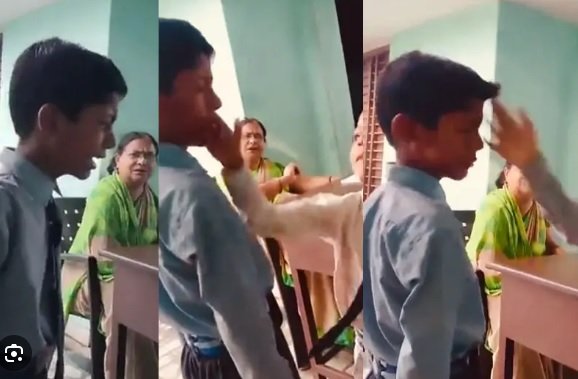Arshad Shaikh reports on the reprimand received by the Uttar Pradesh government at the hands of the Supreme Court of India over the Muzaffarnagar School child slapping incident. The apex court expressed its strong disapproval at the manner in which the case was pursued. The Supreme Court Bench of Justices AS Oka and Pankaj Mithal used some strong words regarding the nature of the crime and directed the UP government to appoint a senior IPS officer to head the probe into the incident.
In an incident captured on video that made headlines last month, a teacher gave instructions to her students in the classroom, to take turns to slap and beat a fellow student. The incident occurred at Neha Public School in Khubbapur village.
The teacher, Tripta Tyagi made derogatory remarks about the student’s Muslim background and disparagingly referred to “Mohammedan children.”She claimed that she punished the boy because he had made errors in his multiplication tables and that his parents had told her to keep him “tight” as he was a lazy student. Speaking to the media, she said, “I made a mistake by getting the child beaten up by fellow students. I am handicapped and couldn’t get up, so I asked the students to slap the child.” She claimed the video was tampered and that she continued to enjoy the support of the local community. The slapping incident caused a national outrage with condemnations pouring in and calls for strict action against the teacher.
On August 26, an FIR was registered by renowned social activist Tushar Gandhi based on the father’s complaint. The FIR charged the teacher with Sections 323 (voluntarily causing hurt) and 504 (intentional insult with intent to provoke breach of the peace) of the Indian Penal Code (IPC). Appearing for Gandhi, Advocate Shadan Farasat, argued that the incident also warrants charges under Sections 75 and 82 of the Juvenile Justice (Care and Protection of Children) Act, 2015. However, the police did not invoke these sections, which prescribe penalties for physical abuse and corporal punishment. Application of these sections may have led to imprisonment for a period ranging from three months to five years.
The petition additionally sought preventive and remedial actions within the school systems to address violence against children, particularly those from religious minority backgrounds. It asserts that this incident may instill fear in students and parents, discouraging them from sending their children from marginalized communities to schools. Meanwhile, it was reported that the father of the boy has decided to transfer his son along with two of his siblings to a different school.
Hearing the petition, the Supreme Court bench came down heavily on the Uttar Pradesh government on the manner in which they allowed the case to proceed. The bench observed, “If the allegations are correct,” it must “shock the conscience of the state government.”
It remarked, “Unless there is an effort made to inculcate importance of constitutional values in students, there cannot be quality education. There cannot be quality education if a student is penalised only on the grounds of his or her religion. Thus, there is a prima facie failure by the state government to comply with the mandates of the RTE Act and the rules framed thereunder.
“The State will place on record a compliance report on the implementation of RTE Act and the rules in relation to the victim of the offence in question. The state will provide better education to the victim child and counselling to all children involved in the incident through expert child psychologists. Considering the manner in which the police have taken action and especially the fact that though a case for cognisable offences was made out, only a non-cognisable offence was invoked, it is directed that the investigation shall be overseen by a senior police IPS officer.
“This is a case not only on a failure to set criminal law in motion but there is also a violation of fundamental rights under Article 21A (RTE). If the allegations are correct, this may be the worst kind of physical harassment by a teacher in as much as the teacher asked other students to assault the victim. Keep aside this incident for a minute; we are more concerned about the quality of education in your state. Quality education includes sensitive education. Here, a teacher gave a mandate to beat a child because of his religion? What kind of education is being imparted?”
The bench fixed the next hearing on October 30.
The climate of hate prevailing in the country has entered the gates of schools and colleges. It has not spared students and teachers from its venom. The policy of silence adopted by those in the highest echelons of power is having a detrimental effect on the social fabric of our country and it is leading to intolerance and polarization on religious lines. The fast-spreading Islamophobia in schools and college campuses should be addressed officially by the government recognizing it as a social evil and drafting appropriate laws to end the menace.
Muslims must do their utmost to reach out to the majority community and clear any misconceptions they may have regarding Muslims and Islam. Media can play an important role in sensitizing the public against Islamophobia.


